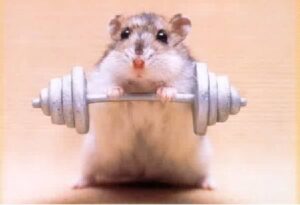Hamsters are popular small pets known for their cute appearance and low maintenance. They come from various species, each with unique characteristics and traits. One aspect that is often considered when owning a hamster is its weight. Hamster owners need to understand the normal weight range for their specific species and how to maintain the hamster’s weight.
Hamsters are small rodent pets that are commonly kept as household pets. They come in different breeds and species, but the most common domesticated hamster is the Syrian hamster, also known as the golden or teddy bear hamster. A fully grown Syrian hamster typically weighs between 4 to 7 ounces. Other species, such as Dwarf hamsters like the Chinese or Russian hamsters, can weigh between 1.5 to 3.5 ounces.
It is important to monitor your hamster’s weight to ensure they are in a healthy weight range. A healthy weight for a hamster can be determined by consulting with a veterinarian who can take into account all factors such as breed, age, sex, health history, and your hamster’s current body condition.
Feeding a balanced diet and providing enough exercise is key to maintaining a healthy weight. Regular check-ups can also help to keep track of your hamster’s weight and overall health. It’s important to note that a sudden weight loss or gain could be a sign of an underlying health condition, so it’s important to seek veterinary advice if you notice any weight changes.
Weight of hamster

A healthy weight for a hamster is usually around 2-4 ounces, depending on the breed and sex. Syrian hamsters, for example, are generally larger and heavier than dwarf hamsters. Factors such as diet, exercise, and living environment will play a crucial role in the weight of your hamster.
A healthy hamster should have a smooth and plump body without protruding bones and firm flesh. It should also have a visible waistline and not be overweight or underweight.
However, it’s important to keep in mind that every hamster is different and has individual needs. Thus consulting with a veterinarian is always the best way to ensure that your pet is at a healthy weight.
Regular check-ins with a veterinarian and monitoring their weight regularly can help ensure that your hamster maintains a healthy weight throughout its life. A veterinarian can help you establish a healthy weight range for your hamster, considering breed, age, sex, and individual factors such as activity level and metabolism.
What is the average weight of a pet hamster?
Syrian hamsters, also known as Golden or Teddy Bear hamsters, are generally larger than Dwarf hamsters and can weigh around 4-6 ounces as adults. On the other hand, Dwarf hamsters such as Russian, Chinese, and Roborovski, tend to be smaller and typically weigh around 1.5-2.5 ounces as adults.
It is important to note that a healthy weight for a hamster is not necessarily the same as the average weight. A healthy weight range will depend on the type of hamster and its age, as well as individual factors such as activity level and metabolism.
Factors like diet, exercise, and environment will also play an important role in their weight. Regular check-ins with a veterinarian and monitoring their weight regularly can help ensure that your hamster maintains a healthy weight throughout its life.
How much should a fully-grown hamster weigh?

Depending on the species, a fully grown hamster typically weighs between 4 to 7 ounces. The most common domesticated hamster is the Syrian hamster, also known as the golden or teddy bear hamster. This species can reach an average weight of 4 to 7 ounces.
On the other hand, Dwarf hamsters like the Chinese or Russian hamsters, which are slightly smaller than the Syrian hamster, can weigh between 1.5 to 3.5 ounces. However, it’s worth noting that some individuals may weigh slightly more or less depending on genetics, diet, and overall health.
It’s important to monitor your hamster’s weight to ensure they are in a healthy weight range. A healthy weight for a hamster can be determined by consulting with a veterinarian who can take into account all factors such as breed, age, sex, health history, and your hamster’s current body condition.
Feeding a balanced diet and providing enough exercise is key to maintaining a healthy weight. Regular check-ups can also help to keep track of your hamster’s weight and overall health.
Is my hamster overweight or underweight?
A healthy weight for a hamster is usually around 2-4 ounces, depending on the breed and sex. Syrian hamsters, for example, are generally larger and heavier than dwarf hamsters.
A good way to check if your hamster is at a healthy weight is by feeling its ribcage. You should be able to feel their ribs without them being visible, and you should be able to see a slight waistline.
Additionally, you can check for signs of obesity like lack of energy, difficulty moving around, or difficulty breathing. A veterinarian can also help you determine if your hamster is overweight or underweight by considering its age, breed, sex, and individual factors such as activity level and metabolism.
Regular weight check-ups and monitoring, along with a healthy diet and exercise, can help ensure that your hamster maintains a healthy weight throughout its life.
What is a healthy weight range for a hamster?

The most common domesticated hamster is the Syrian hamster, also known as the golden or teddy bear hamster. This species can reach an average weight of 4 to 7 ounces. Dwarf hamsters like the Chinese or Russian hamsters, which are slightly smaller than the Syrian hamster, can weigh between 1.5 to 3.5 ounces. It is important to remember that these small rodents are unique, and their ideal weight may vary.
A more accurate way to determine the healthy weight range for a hamster is by consulting with your veterinarian. They will consider all the factors, such as species, age, sex, health history, and your hamster’s current body condition to determine your pet’s ideal weight range.
Also, you can monitor your hamster’s body condition score, which gives a numerical value to the hamster’s weight based on how it looks and feels. A score of 5 indicates that the hamster is at an ideal weight. Remember that sudden weight changes should be reported to the vet, which could indicate an underlying health condition.
Can a hamster’s weight affect their health?
A hamster’s weight can greatly affect its overall health and well-being. Being either overweight or underweight can lead to a variety of health issues. For example, an overweight hamster can develop diabetes and heart disease and have a higher risk of developing tumors.
Additionally, excess weight puts additional pressure on joints, making it difficult for them to move around comfortably and reducing their mobility.
On the other hand, being underweight can also negatively affect the hamster’s health. Underweight hamsters may suffer from malnutrition, leading to a weakened immune system and increased susceptibility to disease.
Furthermore, underweight hamsters may have poor coat conditions and difficulty reproducing.
How do I know if my hamster is at a healthy weight?

A healthy weight for a hamster will vary depending on the breed and individual size of the animal, but generally, a hamster should have a visible waist, and the spine should not be easily felt through the fur. You should also be able to feel the bones of the hips, but they should not be visibly protruding. If your hamster is overweight, you will notice an accumulation of fat around the base of the tail, and the abdomen will appear large and distended.
It’s important to monitor your hamster’s weight regularly and adjust its diet as needed. An appropriate diet for a hamster should consist of a balance of protein, carbohydrates, and fat, with a variety of fresh fruits and vegetables.
Avoid high-fat treats and sugary foods, which can lead to weight gain and other health problems. Hamsters also require a lot of exercises, so be sure to provide them with a large cage or playpen with plenty of room to run and play.
What factors can affect a hamster’s weight?
A hamster’s weight can be affected by various factors, including diet, exercise, and overall health.
A diet high in fat and calories can lead to weight gain in hamsters, while a diet low in nutrients can cause weight loss.
Inadequate exercise can also contribute to weight gain, while regular exercise can help maintain a healthy weight. Hamsters prone to certain health conditions, such as diabetes, may also experience weight changes.
Additionally, the age and breed of a hamster can also affect its weight. For instance, Dwarf Hamsters are smaller than Syrian hamsters and thus have different weight ranges and diet needs.
It is important to monitor a hamster’s weight and adjust its diet and exercise routine to ensure that it stays healthy.
How can I help my hamster reach a healthy weight?

Helping your hamster reach a healthy weight will involve a combination of diet and exercise. It’s important to provide your hamster with a balanced diet that includes a variety of fresh fruits and vegetables, as well as a source of protein such as cooked lean meats or high-quality hamster food. Avoid high-fat treats and sugary foods, which can contribute to weight gain.
Exercise is also important in helping your hamster reach a healthy weight. Be sure to provide your hamster with a large cage or playpen with plenty of room to run and play. You can also include exercise equipment such as a wheel, tubes, and climbing structures in their cage. This will encourage them to move around and burn off excess calories.
Additionally, you can spend some time every day playing with your hamster outside its cage, in a secure and safe place, to give them more time to move around and explore.
What is the ideal weight for a hamster according to breed standards?
The ideal weight for a hamster can vary depending on the breed of the animal. For example, Syrian hamsters, also known as Golden or Teddy Bear hamsters, are larger and can weigh between 150-300g. Dwarf hamsters, on the other hand, are smaller in size and can weigh between 30-85g. It is important to note that it is not only the weight that is important but also the body’s condition.
A healthy weight should not be achieved at the expense of a thin or overweight appearance. Suppose you are unsure of your hamster’s ideal weight. In that case, it’s best to consult a veterinarian or a professional breeder who can give you specific guidance based on your hamster’s breed, age, and individual size.
It’s important to note that the general weight standard may vary from the actual weight of the individual animal. Age, health condition, diet, and exercise can affect the animal’s weight. Therefore, it is important to have regular check-ups with a veterinarian, to monitor their weight and overall health condition. It is also important to adjust diet and exercise plans according to the animal’s weight and other health conditions.
Does the weight of a hamster vary according to the species variation?

The weight of a hamster can vary depending on the species. The five most common species of pet hamsters are Syrian, Dwarf Campbell Russian, Dwarf Winter White Russian, Chinese, and Roborovski.
Syrian hamsters are the largest species of pet hamsters and can weigh between 150-300g. Dwarf Campbell Russian and Dwarf Winter White Russian hamsters are slightly smaller, typically weighing between 30-85g. Chinese hamsters are also small, usually between 20-40g Finally, Roborovski hamsters are the smallest species of pet hamster, usually weighing between 20-25g.
It’s important to note that some variation in weight can also occur within each species depending on factors such as age, diet, and exercise. Therefore, it’s important to monitor your hamster’s weight regularly, with the help of a veterinarian, and to adjust their diet and exercise plan as needed to ensure that they maintain a healthy weight.
Conclusion
In conclusion, the weight of hamsters is an important factor to consider when it comes to their overall health. Keeping your hamster at a healthy weight can help to prevent many health issues, such as obesity-related diseases, diabetes, and respiratory problems.
A balanced diet and regular exercise can help ensure that your hamster maintains a healthy weight while improving their overall well-being.
However, it’s also important to note that being underweight can also be a health concern for hamsters. Underweight hamsters may have decreased energy levels and weakened immune systems, making them more susceptible to illnesses.
Therefore, it’s crucial to monitor your hamster’s weight and overall body condition to ensure that they are not too thin. Consulting with a veterinarian or a professional breeder can help you determine an ideal weight range for your hamster based on its breed, age, and individual size. By keeping a close eye on your hamster’s weight and overall health, you can help ensure that they live happy and healthy life.

